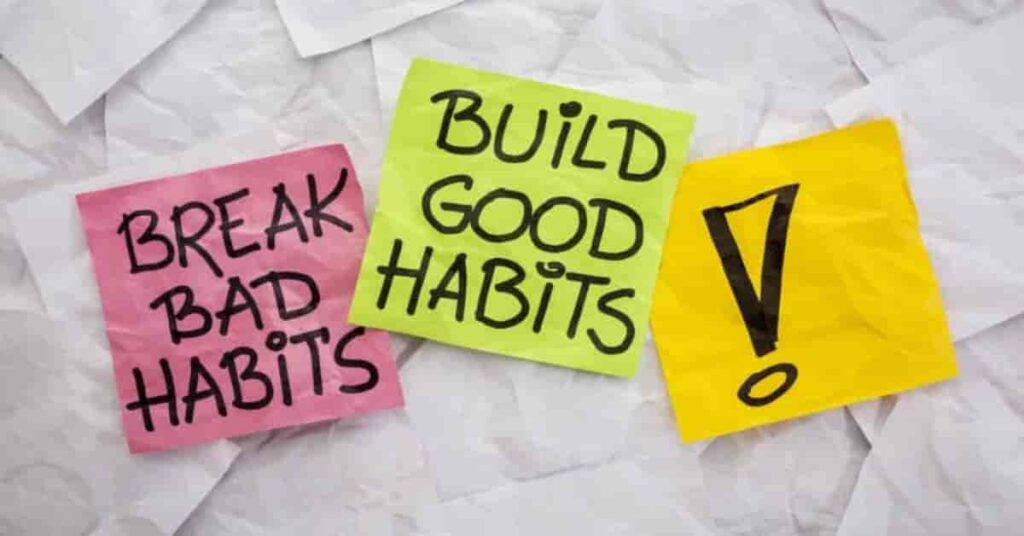Table of Contents
1 - Introduction
2 -The Significance of Good Habits
2.1 Building Positive Relationships
2.2 Fostering Trust and Respect
2.3 Strengthening Communication Skills
2.4 Cultivating Empathy and Compassion
3 - The Impact of Bad Habits
3.1 Strained Relationships
3.2 Eroding Trust and Respect
3.3 Communication Breakdown
3.4 Lack of Empathy and Compassion
4 - Habits in Social Settings
4.1 Good Habits in Social Gatherings
4.2 Bad Habits to Avoid in Social Interactions
5 - The Psychology of Habits
5.1 Habit Formation
5.2 Breaking Bad Habits
5.3 Cultivating Good Habits
6 - Practical Solutions
6.1 Self-Awareness and Reflection
6.2 Setting Realistic Goals
6.3 Seeking Support and Accountability
6.4 The Power of Habit Stacking
7 - Conclusion
1. Introduction
In our journey through life, we often overlook the profound impact our daily habits have on our social interactions. The actions we repeat, whether they are beneficial or detrimental, shape the way we build connections with others and the quality of relationships we cultivate. Imagine this as if life were a grand stage and your daily habits were the actors, playing pivotal roles in the drama of your social life. In this informative guide, we will delve into how these habits, both the commendable ones and those that could use improvement, influence our social lives. Moreover, we’ll furnish practical solutions for anyone seeking to enhance their social experiences.
For instance, consider a college student named Sarah. Sarah has a habit of actively listening when her friends talk and offering genuine compliments when they achieve something significant. This habit of showing empathy and support enriches her friendships and makes her a sought-after companion. On the other hand, her friend, Alex, has a habit of constantly interrupting others during conversations and rarely showing appreciation. This behavior often strains his relationships and leads to frequent misunderstandings.
1.1 Definition of Good & Bad Habits
Good habits are the things we do often that benefit us. These actions contribute to our well-being, joy, and achievements. Examples of good habits encompass consuming fruits and vegetables, engaging in physical activities, maintaining dental hygiene, and showing kindness to people. By embracing these practices, we promote our physical fitness, ensure the cleanliness of our teeth, and construct strong and positive relationships.
Bad habits might entail overindulging in unhealthy snacks, smoking, experiencing insufficient sleep, and displaying unkindness to others. Engaging in these negative behaviors can result in issues like obesity, respiratory problems, fatigue, and strained relationships.

1.2 Importance of Social Life
Social life is very important because it has a big impact on our habits, both good and bad. It’s all about spending time with friends, family, and other people in our community. Having a strong social life can help us develop good habits and avoid bad ones.
Good social connections can encourage good habits. When we spend time with friends who exercise, eat healthy, and make good choices, we’re more likely to do the same. We might join them for a run, share a healthy meal, or get support for making positive changes. These interactions can motivate us to adopt good habits.
On the flip side, a poor social life can lead to bad habits. If we hang out with people who smoke, drink too much, or engage in other harmful behaviors, we might be tempted to join in. Peer pressure can lead us to pick up bad habits, as we want to fit in with the group.
Moreover, our social circle can provide emotional support. When we’re feeling stressed or unhappy, talking to friends and family can help us cope without resorting to bad habits like overeating or smoking.
2. The Significance of Good Habits
The key to having a great social life is having some good habits that make your interactions and relationships better. These habits help you make friends and open up new possibilities. Let’s explore how these positive behaviors impact our social lives:
2.1 Building Positive Relationships
Good habits are the things we do often that benefit us. These actions contribute to our well-being, joy, and achievements. Examples of good habits encompass consuming fruits and vegetables, engaging in physical activities, maintaining dental hygiene, and showing kindness to people. By embracing these practices, we promote our physical fitness, ensure the cleanliness of our teeth, and construct strong and positive relationships.
Bad habits might entail overindulging in unhealthy snacks, smoking, experiencing insufficient sleep, and displaying unkindness to others. Engaging in these negative behaviors can result in issues like obesity, respiratory problems, fatigue, and strained relationships.
2.2 Fostering Trust and Respect:
Trust and respect are the cornerstones of any successful social interaction. Good habits like honesty, reliability, and consistency reinforce trust and respect in our relationships. People are naturally drawn to those who exhibit these qualities, which help to create a solid social support network.
2.3 Strengthening Communication Skills
Effective communication is essential for any social interaction, be it with family, friends, colleagues, or strangers. Good habits in communication, including active listening, clear expression, and constructive feedback, enable us to convey our thoughts and emotions effectively. These skills are crucial for resolving conflicts, avoiding misunderstandings, and nurturing positive relationships.
2.4 Cultivating Empathy and Compassion
Empathy and compassion are the glue that binds us to one another. Good habits, such as putting yourself in others’ shoes and offering a helping hand, create a nurturing environment where people feel understood and cared for. These habits promote a sense of unity and solidarity in your social circle.
3. The Impact of Bad Habits
Good habits make our social lives better, but bad habits do the opposite, leading to problems, misunderstandings, and tense relationships. It’s important to spot and deal with these bad behaviors to make our social world more peaceful and friendly. Here’s how bad habits can disrupt our social lives:

3.1 Strained Relationships
Bad habits, such as dishonesty, unreliability, or excessive negativity, can strain relationships to the breaking point. People are less likely to trust and confide in individuals who consistently exhibit these behaviors. Over time, strained relationships can lead to isolation and loneliness.
3.2 Eroding Trust and Respect
Bad habits erode the foundation of trust and respect upon which social interactions are built. When you’re known for breaking promises, spreading gossip, or being consistently self-centered, it’s challenging to earn the respect of those around you. Trust and respect, once damaged, can be difficult to rebuild.
3.3 Communication Breakdown
Bad habits in communication, like interrupting others, failing to listen attentively, or responding with anger, can lead to communication breakdowns. These behaviors hinder effective dialogue, often resulting in misunderstandings, conflicts, and alienation.
3.4 Lack of Empathy and Compassion
A lack of empathy and compassion, fueled by bad habits such as apathy or selfishness, can isolate us from our social circles. Empathy and compassion are the threads that connect us to one another emotionally. When absent, relationships may lack the depth and warmth they deserve.
4. Habits in Social Settings
Social settings require a delicate balance of behaviors to ensure positive interactions and meaningful connections. Let’s explore the role of habits in various social contexts:
4.1 Good Habits in Social Gatherings
Active Listening: Actively listening to others shows that you value their thoughts and feelings, creating a more enjoyable and productive social gathering.
Smiling and Positive Body Language: A warm smile and open body language can make others feel comfortable and welcome.
Sharing and Giving: Generosity and a willingness to share, whether it’s your knowledge, time, or resources, can enhance your social standing and foster a sense of community.
Offering Support: Being there for friends and family during their ups and downs shows that you care and are willing to help in times of need.
4.2 Bad Habits to Avoid in Social Interactions
Interrupting Conversations: Interrupting others while they’re speaking is a surefire way to annoy and alienate people.
Excessive Smartphone Use: Overuse of smartphones or constant checking of messages can signal disinterest in the conversation at hand.
Negative Gossip: Engaging in negative gossip can harm relationships and breed distrust.
Being Self-Centered: Constantly steering conversations toward yourself without showing interest in others can hinder social connections.
5. The Psychology of Habits
The psychology of habits is a fascinating area of study within the field of psychology that explores the nature, formation, maintenance, and modification of habits. Habits are automatic, routine behaviors that are often triggered by specific cues or contexts and performed with minimal conscious thought. Understanding the psychology of habits can provide valuable insights into how people develop and change their behaviors over time.

5.1 Habit Formation
Habits are formed through a three-step loop: cue, routine, and reward. The cue is the trigger for the habit, the routine is the behavior itself, and the reward is the positive outcome or feeling associated with the habit. Recognizing this loop can help you identify the cues and rewards driving your social habits.
5.2 Breaking Bad Habits
To break bad habits, it’s essential to identify the cue and the reward associated with the habit. Once you’ve pinpointed these, you can consciously replace the routine with a positive one that leads to a similar reward. For example, if you have a habit of interrupting others (bad habit), recognize the cue (feeling the urge to speak) and the reward (feeling heard). Replace the routine (interrupting) with active listening, achieving the same reward.
5.3 Cultivating Good Habits
Cultivating good habits involves deliberately creating a cue-routine-reward loop that promotes the desired behavior. Start small and make gradual changes to build new habits effectively. If you want to become a more active listener (good habit), establish cues (such as reminding yourself to be present in conversations), practice the routine (actively listen), and enjoy the rewards of improved relationships and understanding.
6. Practical Solutions
Recognizing and changing your habits is a transformative journey that requires dedication and self-awareness. Here are some practical solutions to help you get started on the path to improving your social life:
6.1 Self-Awareness and Reflection
Begin by examining your current habits and their impact on your social interactions. Journaling or self-assessment can be invaluable in gaining insights into your behavior.
Seek feedback from trusted friends or family members to gain an outside perspective on your habits.
6.2 Setting Realistic Goals
Identify specific habits you wish to change or develop, and set achievable goals. Starting small can make the process less overwhelming.
Create a timeline for your goals and track your progress to stay motivated.
6.3 Seeking Support and Accountability
Share your goals with a friend or a mentor who can provide support and hold you accountable for your progress.
Consider joining a group or community focused on personal development and habit change.
6.4 The Power of Habit Stacking
Good Habits and Habit Stacking: Good habits are like building blocks. When we put them together in a sequence, it’s called habit stacking. For example, after you brush your teeth in the morning (a habit), you can stack on another good habit like doing a few minutes of exercise. This makes it easier to remember and do them every day.
Impact on Social Life: Good habits can make our social lives better. When we have positive habits like listening well, being on time, or being helpful, people like us more. This can lead to better friendships and relationships. Bad habits, on the other hand, like being rude or always late, can push people away. It’s important to choose good habits to help us get along with others.
7. Conclusion
In the voyage of life, our routines play a crucial role in shaping our social encounters. Positive behaviors, like understanding, active listening, and kindness, enhance our relationships, build trust, and boost communication. Conversely, negative behaviors, such as pessimism, dishonesty, and self-centeredness, can strain connections, erode trust, and lead to communication breakdowns.
Comprehending the psychology of habits, establishing practical objectives, seeking support, and using habit-combining methods are helpful tools for improving our behaviors. Real-life stories of success serve as a reminder that change is achievable, and with commitment and hard work, we can create a more optimistic and gratifying social life.
It’s vital to keep in mind that transformation is a journey, and every little step matters. Begin today by recognizing the behaviors you wish to enhance and the new behaviors you aim to develop. Your social life will benefit from your endeavors, and you’ll discover yourself forming more profound connections, nurturing trust, and fostering significant relationships.
More Detail: Wisewords








